tips & tricks
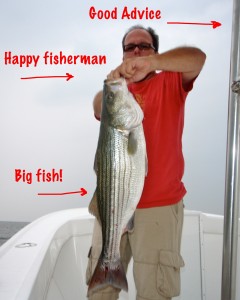 No man, after catching a big fish, goes home through an alley. – Ancient Chinese Proverb
No man, after catching a big fish, goes home through an alley. – Ancient Chinese Proverb
Maybe you’ve heard someone recite another old saying about “the three stages of a fisherman’s life.” It goes something like this: The first stage is when the angler’s main objective is to catch as many fish as possible, the second stage is when the angler only searches for the larger fish, and the third and final stage is when size doesn’t matter and the capture is unimportant, but satisfaction comes from the way the angler tricks the fish. I usually nod my head in agreement when I hear that, but c’mon now, I don’t know one single fisherman who, when given a choice, doesn’t cast toward the biggest fish in the pond. We can wax poetic about the joys of baptizing ourselves in the boundless beauty of nature, and we can sing the praises of that peaceful solitude we find out on the open water, but screw it – the bottom line is, no matter how we are fishing, we want to catch a whopper! In this third and final segment of the Gimme a Breaker series, we’re looking at ways to get the lunkers out of surface blitzing Chesapeake rockfish. Read More!
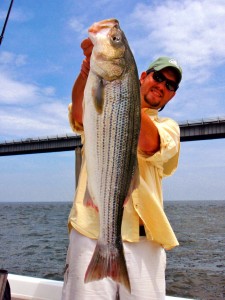 Have you heard? Light tackle casting is producing big fish lately on the Chesapeake Bay. Some lucky anglers are catching fish over 30-inches on almost every trip. Sometimes they get three or four. Most of the fish I’m catching are coming off cover like rocks or bridge pilings, but some have been hooked while fishing submerged structure in open water. Both soft plastics and metal jigs are producing. If you’ve been out, I hope you’re enjoying some lucky days. 30-inch plus stripers in late June is something to celebrate, especially considering how tough fishing has been previously.
Have you heard? Light tackle casting is producing big fish lately on the Chesapeake Bay. Some lucky anglers are catching fish over 30-inches on almost every trip. Sometimes they get three or four. Most of the fish I’m catching are coming off cover like rocks or bridge pilings, but some have been hooked while fishing submerged structure in open water. Both soft plastics and metal jigs are producing. If you’ve been out, I hope you’re enjoying some lucky days. 30-inch plus stripers in late June is something to celebrate, especially considering how tough fishing has been previously.
In my opinion, seasoned anglers make a lot of their own luck. Since the fish are more inclined to bite now, I thought it might be worthwhile to discuss tips for hooking and landing bigger fish – just some little things that can move fishermen up from the usual summer schoolies to true summer trophies. You probably have a few tips as well, so feel free to share them in the comments section. I’ll start with the basics: Read More!
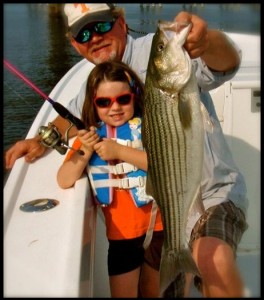 I recently found some old pictures of myself in diapers, standing beside a small wooden boat parked in front of a Tennessee farmhouse. Towering above me was my father, and at my bare feet was a nice stringer of fat largemouth bass. Did I catch them? Probably not, but like any good fisherman, I’ll happily take the credit. I might even tell you a tall tale about how – at the ripe old age of two – I tricked them into biting a lure that I hand carved from a boar’s tusk with a Bowie knife, and how they pulled harder than a Smoky Mountain mule.
I recently found some old pictures of myself in diapers, standing beside a small wooden boat parked in front of a Tennessee farmhouse. Towering above me was my father, and at my bare feet was a nice stringer of fat largemouth bass. Did I catch them? Probably not, but like any good fisherman, I’ll happily take the credit. I might even tell you a tall tale about how – at the ripe old age of two – I tricked them into biting a lure that I hand carved from a boar’s tusk with a Bowie knife, and how they pulled harder than a Smoky Mountain mule.
There’s no doubt that I owe much of what I know about fishing to my father. There’s nothing better than fishing with family. All three of my sons have become first-class fishermen. This week I’ve been fishing with my family’s next generation of anglers. I’ve had a great time on the water with my son Daniel and my granddaughter Ella. I’m happy to report that Chesapeake Bay salinity levels are finally climbing back toward normal levels (see chart below), although they’re still low. Since conditions are stablizing, striped bass fishing is getting a little more reliable. That isn’t to say some days aren’t better than others, but we’re at the point where I at least think we can count on a few fish on any given outing.
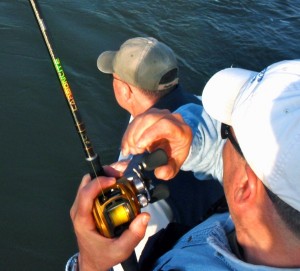 According to Wikipedia, sensitivity training is a method of behavioral modification that makes people more aware of their prejudices. Lately, I feel like I should be a little more sensitive. No, I don’t think I need to nicer to the trollers or more chivalrous to the ladies. I’m doing pretty good with those things. I’m thinking of the sensitivity I get when I have a jigging rod in my hands. When it comes to fishing, I want to be completely in-tune with my touchy-feely side.
According to Wikipedia, sensitivity training is a method of behavioral modification that makes people more aware of their prejudices. Lately, I feel like I should be a little more sensitive. No, I don’t think I need to nicer to the trollers or more chivalrous to the ladies. I’m doing pretty good with those things. I’m thinking of the sensitivity I get when I have a jigging rod in my hands. When it comes to fishing, I want to be completely in-tune with my touchy-feely side.
Due to the big crowds around the warm water discharges this spring, I’ve had plenty of opportunities to watch other light tackle fishermen in action. I’ve seen some very good anglers out there. On the other hand, I’ve noticed a few guys who have struggled. Other than disregarding the basic principles of stealth, the biggest mistake I see fishermen make is not feeling for their lures to touch the bottom when they’re jigging. Read More!
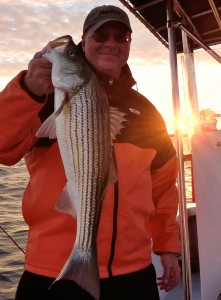 What has been will be again,
What has been will be again,
What has been done will be done again;
There is nothing new under the sun -Ecclesiastes 1:9
Since Candy Thomson published an article about my favorite jigging technique in today’s Baltimore Sun, I thought I might talk about it a little more. First, thanks to Candy for the nice write-up. She had originally planned to fish with us, but unfortunately broke a finger in a kayak accident a couple of days before. She decided to come along anyway and it was great having her, Joe, and Colin on Thunder Road for a fun evening of catching. I’m a big fan of Candy’s Outdoors Girl blog. I don’t always agree with her, but I never miss an entry. There’s no question that, despite the splint she’s wearing lately, she has her finger squarely on the pulse of outdoor issues in Maryland.
I’ll start this article by stating the obvious in that casting artificial lures for stripers using outfits made for freshwater black bass is nothing new – my father taught me to catch stripers using bass lures when I was very young. I had never heard of using heavy duty saltwater trolling gear for rockfish until I moved from Tennessee to Maryland. I was amazed and somewhat amused the first time I saw a twenty-five rod planer board trolling spread. Read More!
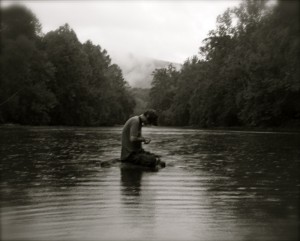 There are a lot of things that get in the way of fishing, but rain should not be one of them. Some of my most productive days on the water have been when skies are drizzly and gray or even when it’s pouring. In the Chesapeake, where fishing pressure has a significant impact on fish-feeding behavior, rain keeps the crowds at home and opens up those over-fished hot-spots where the bite can be impossible when the weather is nice. This weekend however, out-fishing the crowds was not part of the equation. My boys and I had planned a stream fishing trip in the East Tennessee Mountains, and we were not about to let a little thing like a forecasted 4-inch deluge stand in the way.
There are a lot of things that get in the way of fishing, but rain should not be one of them. Some of my most productive days on the water have been when skies are drizzly and gray or even when it’s pouring. In the Chesapeake, where fishing pressure has a significant impact on fish-feeding behavior, rain keeps the crowds at home and opens up those over-fished hot-spots where the bite can be impossible when the weather is nice. This weekend however, out-fishing the crowds was not part of the equation. My boys and I had planned a stream fishing trip in the East Tennessee Mountains, and we were not about to let a little thing like a forecasted 4-inch deluge stand in the way.
It may seem out of context to post a southern Appalachian stream-fishing report to a website dedicated to fishing in the Chesapeake Bay. I hope you’ll grant me the indulgence because most of the techniques I use to fish the Chesapeake were honed over many years of fishing in the southeast. One of the most important secrets to my Bay fishing success has been using the tidal currents to my advantage. I learned to do that in the rivers and creeks of the mountains. For example, Read More!


